 Marine protected areas (MPAs) rightly attract more attention as international biodiversity agreements see them as major instruments to stop mass species extinctions and recover ocean health. Upon the initiative of MEPs Stéphane Bijoux and Catherine Chabaud the hybrid meeting on 7 November 2023 in the European Parliament and online featured results from the EU Ocean Governance project and other related projects.
Marine protected areas (MPAs) rightly attract more attention as international biodiversity agreements see them as major instruments to stop mass species extinctions and recover ocean health. Upon the initiative of MEPs Stéphane Bijoux and Catherine Chabaud the hybrid meeting on 7 November 2023 in the European Parliament and online featured results from the EU Ocean Governance project and other related projects.
With the prospect of the coming Conference of Parties of the Convention on Biological Diversity (CBD) and the third UN Ocean Conference (UNOC3) organised by France and Costa Rica that will take place in 2025, the event intended to highlight the technical and strategic role of networks of MPA managers. They are crucial to help operationalise the ambition. By harnessing marine conservation efforts and catalyzing knowledge and know-how of MPA managers and their partners, MPA networks are key to strengthen the effectiveness of MPA management. Thus they can provide tangible ecological, social and economic contributions to global marine biodiversity conservation and the Sustainable Development Goals (SDGs).
The EU Ocean Governance project was funded by the Service for Foreign Policy Instruments -FPI- of the European Commission upon an EP initiative. So it was natural to report on progress with implementation, which had, like many other endeavours suffered from restrictions during the pandemic. MEP Bijoux, representing his native La Réunion island, in his opening remarks, gave some of the background about how his connection to the ocean had brought him to promote the project. As the effects of sealevel rise and other impacts of climate change could already be felt, it was important to hone the broadest possible international cooperation to protect the ocean. He was convinced that networks of MPAs - call it the blue belt - were the best way to combine ecological and economic objectives.
Two short keynote addresses then set the scene. The first was by Ambassador Olivier Poivre d'Arvor, Special Envoy of the President of the French Republic for UNOC3. He evoked the ambition for an inclusive, action-oriented conference. He expected that the strong political endorsement building up in the run-up to UNOC3 would create new momentum for more cooperation for a healthy and productive ocean. He signalled openness to take the blue belt concept on board, subject to the applicable rules and procedures of the UN.
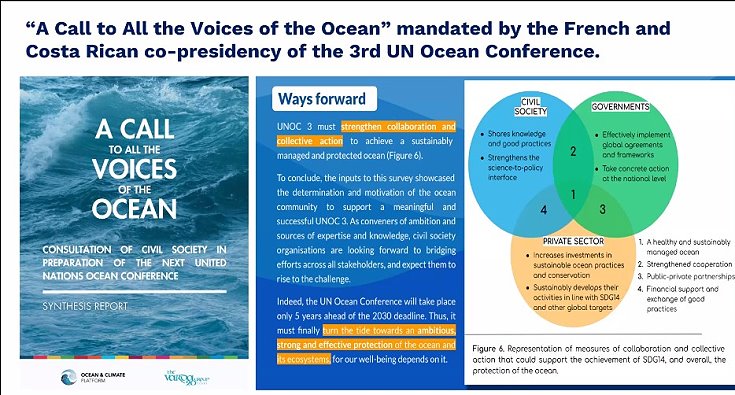
The representative of Director Céline Idil of DG MARE/B underscored the urgency of taking collective responsibility for a clean, healthy and productive ocean. The two biodiversity treaties now open to ratification were expected to be game changers: the Kunming-Montreal Global Biodiversity Framework and the
Dr. Purificació Canals, Technical Coordinator of the EU Ocean Governance project in the following gave a dense report of how the project had connected to different networks of MPA managers in the Atlantic, Indian and Pacific Ocean. These exchanges focused on learning from each other and working to enhance the effectiveness. After the short time of real project implementation much remained to be done. In the future, even more attention needed to be paid to advocacy for stronger policy support and financing the networks and the MPAs themselves.
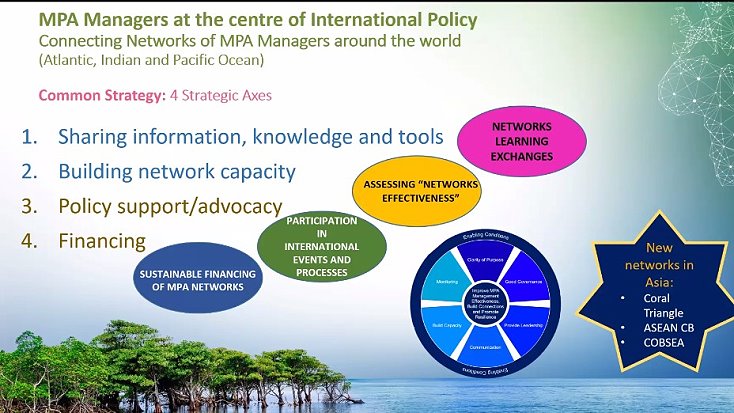
Moderator MEP Catherine Chabaud drew a preliminary conclusion when she said that ocean and MPA cooperation served to preserve peace. This feature was particularly critical in today's world and needed continued support from Europe and other countries and regions.
Carole Martinez of the MEDPAN project reiterated how the collaboration of Mediterranean MPA managers was working along similar lines.
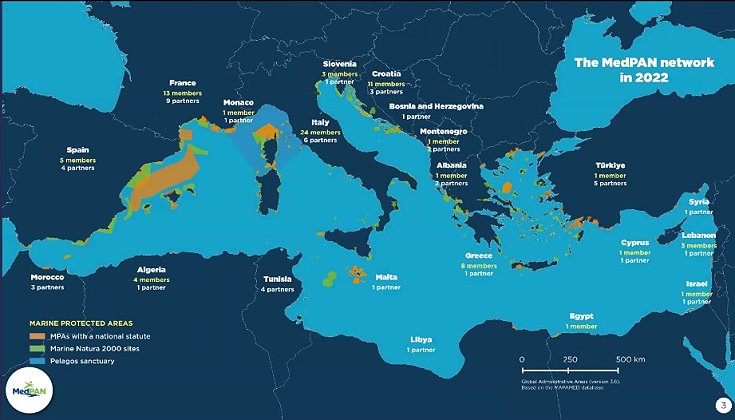
Most MPAs had been declared only relatively recently, thus had not developed the ecosystem restoration effects expected from long-term, mature MPAs. Strengthening the management capacities through joint learning was essential on the road towards these objectives.
Jihyun Lee of the CBD Secretariat explained how important MPAs should be for saving marine biodiversity. She affirmed that there was even more to the Kunming-Montreal Global Biodiversity Framework than target 3, MPAs. She insisted that all countries, citizens and organisations were needed to implement the Framework. A wide range of tools and approaches were made available to adress key pressures.
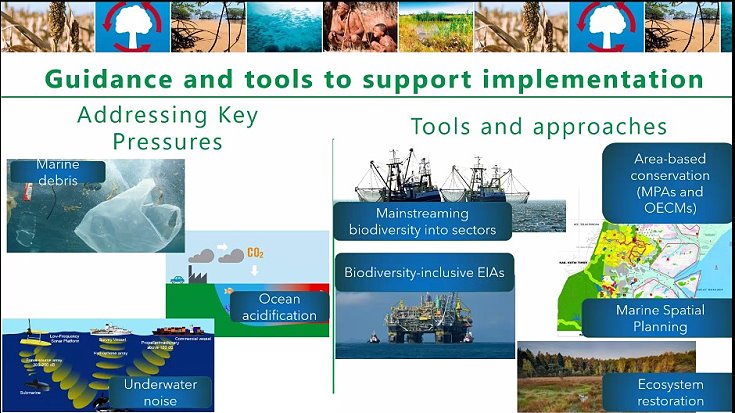
It was important to connect also with diverse other groups, including at local level, to help each other with capacity building and implementation. Jihyun Lee invited to take advantage of all similar-minded organisations and initiatives to enable the needed change at scale. Among those she mentioned was the 'Sustainable Ocean Initiative Global Dialogue'.
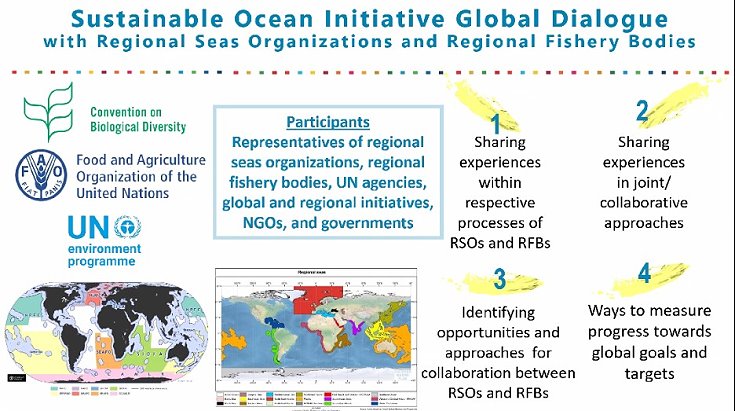
More explanations about the EU project and the agenda with all speakers is available here.
Mundus maris seized the opportunity in the Q&A segment towards the end to ask two questions, particularly expressing concern about the inflationary declaration of MPAs, most of which were, however, paper parks. The second question concerned the concern of whether and if so how the rights of small-scale fishers, men and women, were going to be heard. They needed to be involved in siting new MPAs to reach the objective of protecting 30% of the ocean by 2030 without forced displacement or other threats to their livelihoods. Given the poor track record so far, it was also suggested that participation of fishers in high-level events at, or in the run-up to, UNOC3 could set an example for inclusiveness of such policy processes.
Dr. Puri Canals responded vividly endorsing the need to make rapid progress in effective protection of MPAs. She confirmed that paper parks were THE issue all managers and organisations were grappling with. Governments were called to put up sufficient resources on a continuous basis, including qualified personnel, so as to generate the hoped for biodiversity recovery with its multiple benefits.
In her closing remarks, MEP Catherine Chabaud summed it up: The ocean is a global commons and we as stewards have the responsibility for ocean health.
For more information about the event click here and for the institutional report here.








